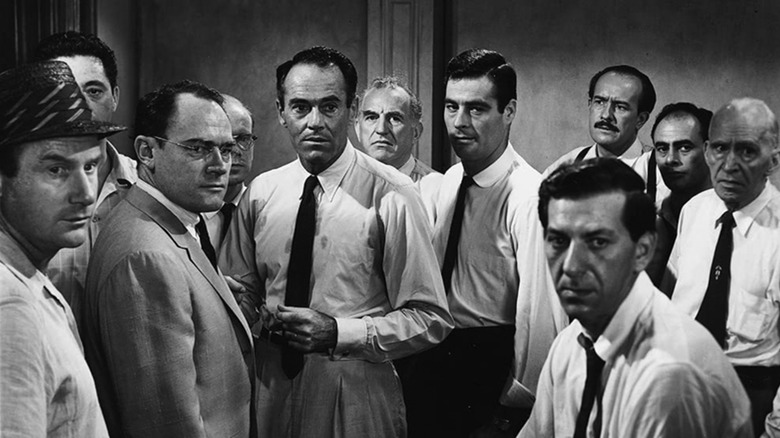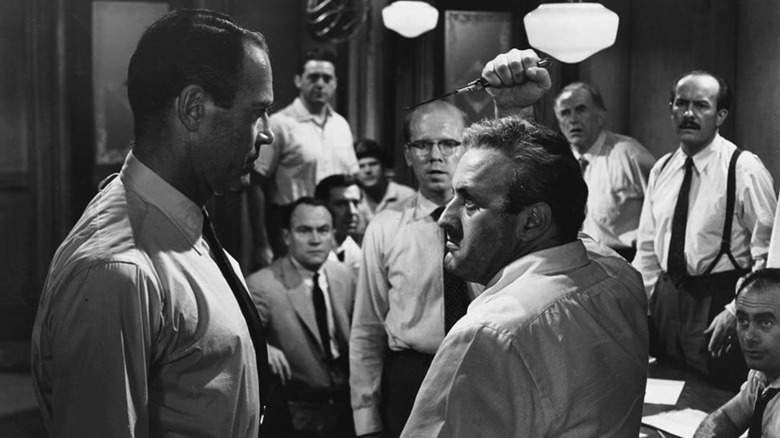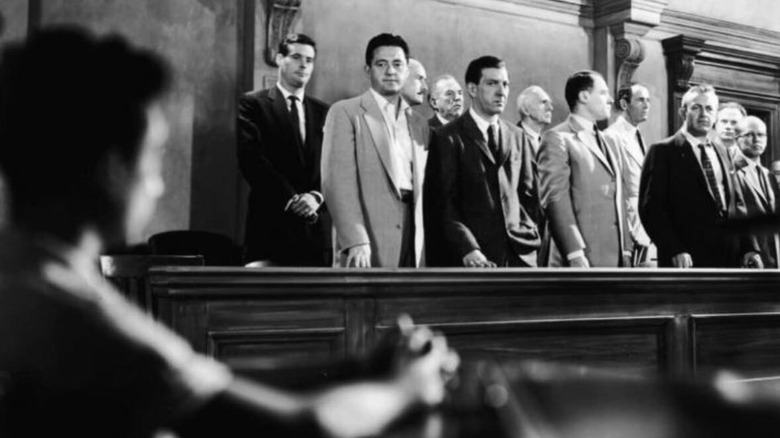
Acclaimed actor Henry Fonda and screenwriter Reginald Rose self-produced Rose's script "12 Angry Men" with $350,000. When they tapped the late, great Sidney Lumet to direct the courtroom drama film, the then-33-year-old had been an accomplished New York theater and TV director, but he had no film credits on his résumé. And even though the film's powerful social commentary remains relevant more than 60 years after its release, striking "become a feature film director" off his bucket list was Lumet's simple goal for agreeing to make the film.
Primarily set in a deliberation room, the movie centers on a dozen jurors who must reach an unanimous vote in a murder trial; for the 18-year-old defendant, a guilty verdict means the electric chair. As the men begin to succumb to the pressure at the responsibility in front of them, the jury room becomes a shouting chamber. For the rookie film director, being constrained to a closed room wasn't a problem. Actually, Lumet used the one room setting to his advantage: He employed a variety of camera tricks to make the room appear smaller and smaller to provoke a sense of claustrophobia in the jurors. However, a challenge he did have to overcome was the transition from TV to film.
The Difference Between TV And Film

Cinephilia & Beyond published an excerpt from movie director and critic Peter Bogdanovich's book "Who the Devil Made It: Conversations with Legendary Film Directors." Bogdanovich's interviewed Lumet and asked him to explain the biggest difference between working in TV and film. Lumet responded with one word: "Scale." He went on to elaborate:
"It's the difference between working on a twenty-one-inch canvas and a seventy-five-foot canvas, and that's a tremendous difference. That doesn't mean that there aren't things that can work in both — there's a certain level of drama that works in everything — but directorially, it's a shift in the eye; it's a shift in the instruments, the tools that you use to focus dramatic attention and so on. And it's also a difference internally — for instance, I've seen some Shakespeare on TV and it's been disastrous. I wonder if the sheer physical size of the screen isn't something that automatically rules out tragedy, for example."
This reminds me of the traditional philosophy that movies are best enjoyed in a movie theater, not streaming at home. Steven Spielberg, who once adamantly refused to submit to streaming, said in 2018 that movies that debut on streaming services shouldn't qualify for any Oscars because they are in essence TV movies. I wonder what Lumet would think about the popularity of streamers like Netflix and Hulu if he were alive today. But that's another story for another time.
'The Laws Of Optics Are Constant'

Years after his interview with Bogdanovich, Lumet reiterated his perspective in an interview with the Television Academy and clarified that methods of storytelling must be adjusted to fit the medium. In other words, you can't execute a story on film identical to the way you would execute it on TV. For him, that lesson was a "tremendously difficult adjustment to make" -- so much so that he admitted it took him six or seven movies before he fully got it. However, his TV experience wasn't exactly useless when he took over the director's chair for "12 Angry Men." He explained to the Television Academy one commonality between the two mediums that served him well:
"The laws of optics are constant. The thirty-five millimeter lens does the same thing on this camera as on a still camera, on a movie camera, on a television camera. There's thirty-five millimeters of distance between where the light crisscrosses and whatever the recording surface is, whether it's film or an image orthicon tube or what have you. And my knowledge of lenses, which is encyclopedic, comes from my live television training."
Lumet was undoubtedly a master behind the camera. The subtle tricks he used in "12 Angry Men" were so brilliantly woven in that you might not catch them until your third or fourth time watching the movie. Honestly, I didn't notice that he gradually shifted from shooting at different eye levels to underscore the rising tension among the jurors as the film progressed. "12 Angry Men" is a classic film being taught in criminal justice and sociology classes today (that's actually how I was introduced to the movie), and Lumet's in-depth knowledge of the camera had a lot to do with the film's lasting legacy.
Read this next: The 22 Greatest Femme Fatales In Movie History
The post How TV Work Prepared Sidney Lumet For 12 Angry Men appeared first on /Film.
0 Commentaires